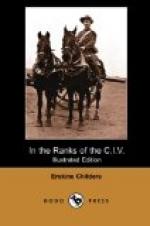As early as April 15th, the word went round that we were under orders to go to Bloemfontein—“as soon as transport could be ready for us.”
“April 15.—Amid great delight the Captain to-day read a telegram saying we are to go to Bloemfontein as soon as the railway can take us. We had just come in from the ride to water in drenching rain and ankle deep in mud, but a great cheer went up. The railway limitation is a rather serious one, as I believe the line is in a hopeless state of block; but we’ll hope for the best. The rainy season has begun in the most unmistakable fashion. It has poured so far in buckets for twenty-four hours; I slept out last night, but daren’t to-night; outlying parts of me got wet, in spite of the waterproof over me. Thank goodness, we have good boots, gaiters, and cloaks. We rode to water at eleven in various queer costumes, and mostly bare legs, and afterwards dug trenches through the lines. The rest of the day we have been huddled in a heap in our tent, a merry crowd, taking our meals in horrible discomfort, but uproarious spirits.
“I still have the roan, but have lost the Argentine and got a bay mare instead; it’s not a bad animal. There was a false alarm of glanders the other day. One of the gun-team had a swollen throat, but it turns out to be something else. I was told off to help foment him with hot water the night it was discovered. He kicked us all, and completely floored me with a kick in the chest, which didn’t hurt happily. Yesterday I had to take him down to the station and foment him from the kitchen boiler of the station-master’s wife. I enjoyed it, as I had plenty of rests, and the station-master’s wife made me delicious tea, served to me by a sweet little white-frocked girl. By the way, on the road to water the other day a caravan full of people stopped us, and small maidens went down the line, giving us apples and cigarettes and cakes.”
Little we understood that ironical “railway” proviso of a harassed general staff. We had been reviewed the day before, and the good practice of our guns had been praised by the inspecting officer. Now was our chance, we thought. Nevertheless, we had to live on that guarded “order” for another month.
But in spite of our disappointment I believe all of us will look back with real pleasure to that time. There was no monotony in the life, thanks to our officers, who continually introduced variety into our work. “Marching order” days were the commonest; but there were others of a lighter sort. On one day we would go for a long expedition in drill-order with the guns, taking cooks and our dinner with us, and have what we used to call a picnic by some pleasant river-side. On another the guns would be left at home, and we would ride out for exercise, often through the pass, which led through a lovely ravine to a pretty little place called Tulbagh, where there was another small camp of troops. Sometimes “bazing”




